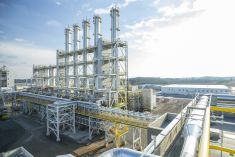WACKER Officially Opens New Production Site in the USA
- POLYSILICON PRODUCTION SITE WITH OVER 20,000 METRIC TONS/YEAR OF CAPACITY AND 650 JOBS IN THE US STATE OF TENNESSEE
- CONSTRUCTION OF WACKER’S LARGEST SINGLE INVESTMENT OF SOME US$ 2.5 BILLION NOW SUCCESSFULLY COMPLETED
- POLYSILICON PRODUCTION LAUNCHED, WITH ALL FACILITIES EXPECTED TO BE FULLY ON STREAM BY Q3 2016
- CEO RUDOLF STAUDIGL: “CHARLESTON GIVES US THE CAPACITY TO MEET DEMAND GROWTH FOR OUR HIGH-GRADE POLYSILICON AND THE BASIS FOR A FULLY INTEGRATED PRODUCTION SITE IN THE WORLD’S SECOND-LARGEST CHEMICAL MARKET”
Charleston (TN) and Munich, Apr 18, 2016
Today, Wacker Chemie AG officially opened its new polysilicon production site in the US State of Tennessee. The ceremony in Charleston was attended by numerous guests from politics, business and government, including Tennessee Governor Bill Haslam and the state’s two US Senators, Lamar Alexander and Bob Corker. The new site is WACKER’s largest single investment ever, totaling some US$ 2.5 billion. WACKER began starting up individual plant sections at Charleston in December after a construction period of just under five years. So far, about 1,000 metric tons of polysilicon have been produced there. In the coming months, WACKER will gradually ramp up production and expects to reach Charleston’s full capacity of over 20,000 metric tons per year in the third quarter of 2016. Currently, the site has about 600 employees and, when fully operational, should have some 650.

In his speech, WACKER CEO Rudolf Staudigl highlighted the fact that growth opportunities are arising due to photovoltaics’ continued progress around the globe. “Cost for electricity produced by photovoltaic systems has declined markedly in recent years. Consequently, this way of generating energy has become even more competitive, which is opening up new markets,” explained Staudigl. Newly installed global capacity would grow again this year, he said, and amount to between 60 and 70 gigawatts according to WACKER’s estimates. Capacity additions would be particularly high in China, the USA, Japan and India. “This will spur demand for high-grade material of the best quality, as supplied by WACKER,” emphasized Staudigl. In the photovoltaic sector, silicon technology has clearly beaten other technologies, he said.
Charleston, continued Staudigl, would give WACKER the basis in the long term for a fully integrated silicon site in the USA, the world’s second-largest chemical market. Currently, WACKER is looking into constructing a new production facility there for its HDK® pyrogenic silica. Ultrapure amorphous silicon dioxide powder is used as a filler in silicone elastomers and as a viscosity-adjusting agent, for example, in coatings, printing inks and adhesives. It also serves as a flow aid in the cosmetics, pharmaceutical and food industries. WACKER is the world’s third-largest manufacturer in this sector.
Presspicture

Distillation columns in Charleston/Tennessee
Distillation columns at the Charleston site in the US state of Tennessee, where WACKER produces hyperpure polysilicon for the solar sector. At its new pyrogenic silica plant, WACKER can further process the resultant tetrachlorosilane byproduct from polysilicon manufacturing into HDK® to create added value.
Order photoContact

Wacker Chemie AG
Media Relations & Information
Christof Bachmair
Tel. +49 89 6279-1830
Email christof.bachmair@wacker.com
Send Message
Contact for Analysts and Investors
Wacker Chemie AG
Investor Relations
Joerg Hoffmann
Tel. +49 89 6279-1633
Email joerg.hoffmann@wacker.com
Send Message
